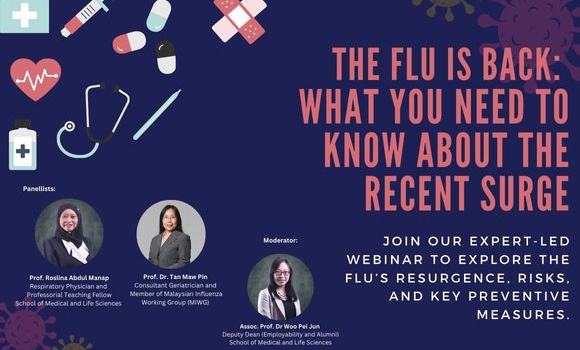We recently hosted a webinar on timely topic of “The Flu is Back: What You Need To Know About The Recent Surge”. Conducting this session online allowed our valued international alumni to join us to learn together!
The webinar was organised in partnership with the School of Medical and Life Sciences to discuss the increasing concern of the surge in flu cases. The moderator for the webinar was none other than Associate Professor Dr Woo Pei Jun, the Deputy Dean (Employability and Alumni) of the School of Medical and Life Sciences.
We were also joined by two esteemed panellists: Professor Roslina Abdul Manap, Respiratory Physician and Professorial Teaching Fellow in the School of Medical and Life Sciences. Together with her was Professor Dr Tan Maw Pin, Consultant Geriatrician and Member of Malaysian Influenza Working Group (MIWG).
Our panellists covered the latest developments, risks, and preventive measures for the flu. They first analysed the similarities and differences between Influenza, COVID-19, and the common cold. Many symptoms actually overlap but the key differences include sudden high fever in influenza, loss of taste/smell in COVID-19, and milder symptoms in the common cold.
They also discussed the recent flu outbreaks in Asia – countries like Japan, Taiwan, and South Korea are facing their worst flu seasons in years, with increased hospitalisations and severe cases reported among young children and the elderly. While anyone can catch the flu, senior citizens, pregnant women, young children, and individuals with chronic conditions (e.g., asthma, diabetes, heart disease) are at higher risk of complications, including pneumonia and hospitalisation.
When discussing preventive measures, vaccine was one of the hot topics. It is said that flu vaccination is crucial as a single flu shot can reduce severe illness, lower the risk of heart disease, and prevent hospitalisation. Studies show that vaccinated individuals have a 40–60% lower chance of getting the flu. Even though many people mistakenly believe that flu shots can cause the flu, but in reality, the vaccine contains inactivated or weakened viruses that cannot make you sick. Besides vaccination, maintaining good hygiene, frequent hand washing, wearing masks in crowded places, and avoiding close contact with sick individuals are effective ways to prevent flu transmission.
There was so much more that was discussed during the webinar so we hope that everyone gained a lot of insights about the flu cases and how we can protect ourselves and our loved ones against it.
We hope to host more webinars in the future to gain valuable lessons and bring together a wider group of our alumni community.




























